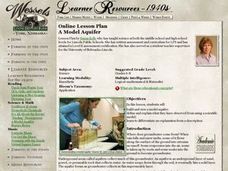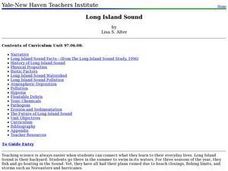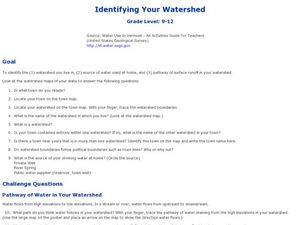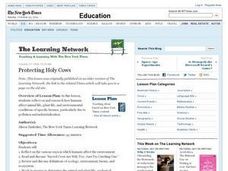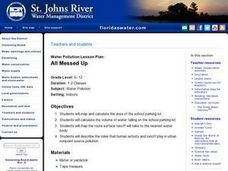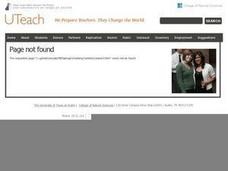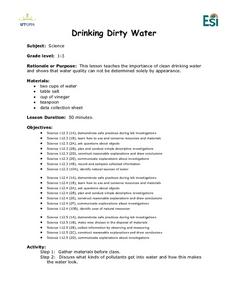Curated OER
Ecology
Students make connections between their daily lives and the usage of natural resources as they relate to the importance of environmental quality. In this ecology lesson, students listen to the story The Lorax by Dr. Seuss and then...
Curated OER
Oil on the Beach
Students explore how oil pollutes the oceans. For this science lesson, students investigate various materials that could be used to clean up an oil spill. Students discuss which materials worked best and how humans can reduce oil spills.
Curated OER
Microbes in Long Island Sound
Students discover the harm and benefits of microbes. In this biology lesson, students explore water, nitrogen and carbon cycles. They investigate the factors affecting bacteria growth.
Curated OER
A Model Aquifer
Students build a model that depicts how water is stored in an aquifer. They examine ways in which groundwater can become contaminated.
Curated OER
Soak it up
Students complete a hands on activity using hard boiled eggs, food coloring, tape, cups, water, and a knife to show how permeability affects animals. In this permeability lesson plan, students complete this activity and learn how...
Curated OER
Particulate Matter
Seventh graders examine the different types of pollutants. In this environmental science lesson, 7th graders observe particulate matter under a microscope. They explain how these can affect once health when breathed in large quantities...
Curated OER
The Environment and You
First graders examine the human environmental impact and discover ways to lessen effects. They create a pollution damage flow chart and write down what they think Mother Earth might say. They create inventions from recyclable materials.
Curated OER
Long Island Sound
Students use the Internet to research the history of Long Island Sound. In groups, they identify the sources of point and nonpoint pollution and how humans are impacting the area. After watching a video, they discuss the role of...
Curated OER
I Won't Live in a Toxic World
Students examine four separate environmental health issues using fish-bowl technique, and discuss roles of both government and citizens in maintaining a pollution-free environment.
Curated OER
Stream Table
Students explore channelization, riparian habitats and soil erosion to find out about the aquatic habitats in Iowa. In this aquatic habitats lesson, students define important terms and read an article about pollution. Students complete...
Curated OER
Identifying Your Watershed
Students identify the watershed where they live and how it is related to their own water consumption. In this watershed lesson students locate their watershed on their town map. The students find the source of their water that they use...
Curated OER
Pond Water Web
Learners identify the different organisms in the food web. In this biology lesson, students create food chains using the information on cards. They explain what happens if an organism is removed or added in the web.
Curated OER
Wetland in a Pan
Seventh graders build a watershed from various materials. In this life science lesson plan, the students will be able to change the design of their watershed to see the changes in the way the water will drain. Each group will be able to...
Curated OER
Protecting Holy Cows
Students study the interrelationships of organisms and their environments. They study ecological communities and determine what is necessary for survival. Students discuss and answer questions concerning a group's biome, habitat, food...
Curated OER
Don't Trust Your Eyes
Pupils brainstorm a list of possible actions that they could do to protect the water resources from pollution. They create hypotheses and conclusions by completing experiments and observing different pollutants.
Curated OER
Is Your Water Clean?
Students conduct tests of water samples from different sources, such as a local river, tap water, and an irrigation ditch. After determining which pollutants are present in each sample, students hypothesize the possible sources of the...
Curated OER
All Messed Up
Young scholars begin the experiment by mapping and calculating their school parking lot. They calculate the volume of water falling on the lot and map the route the water runoff takes. They discuss the roles that humans play in affecting...
Curated OER
Water Quality
Students are presented with a hypothetical situation to investigate the water quality of the James River. They are given data to analyze and put into the graphic organizer that is included to help solve the problem. The lesson plan...
Curated OER
Remove Pollutants from Water
Students examine how to remove pollutants from water to create clean water. In this boiling water lesson students complete a lab activity that purifies water.
Curated OER
Air Pollution: Visible And Invisible
Fourth graders observe air pollution that is visible and invisible with experimentation. During the experiment the students collect data that needs analysis. The observations are recorded in the lab journal. The data also is represented...
Curated OER
Is Dilution the Solution to Pollution?
Students explore the different types of pollution. they conduct experiments using dye mixed with tap water to measure the levels of dilution. They discuss at what point the dye (pollution) would be diluted enough to be safe to drink.
Curated OER
Drinking Dirty Water
Students consider the importance of clean drinking water. They conduct a taste experiment with water, adding incremental drips of salt and vinegar to determine at which point it doesn't taste drinkable.
Curated OER
Pollution Solutions: Questions of Quality
Students investigate variations in water quality.
Curated OER
Pelicans in Peril
In this Gulf oil spill instructional activity, students examine an article regarding the brown pelican and the effects of the oil spill as well as a photograph.





